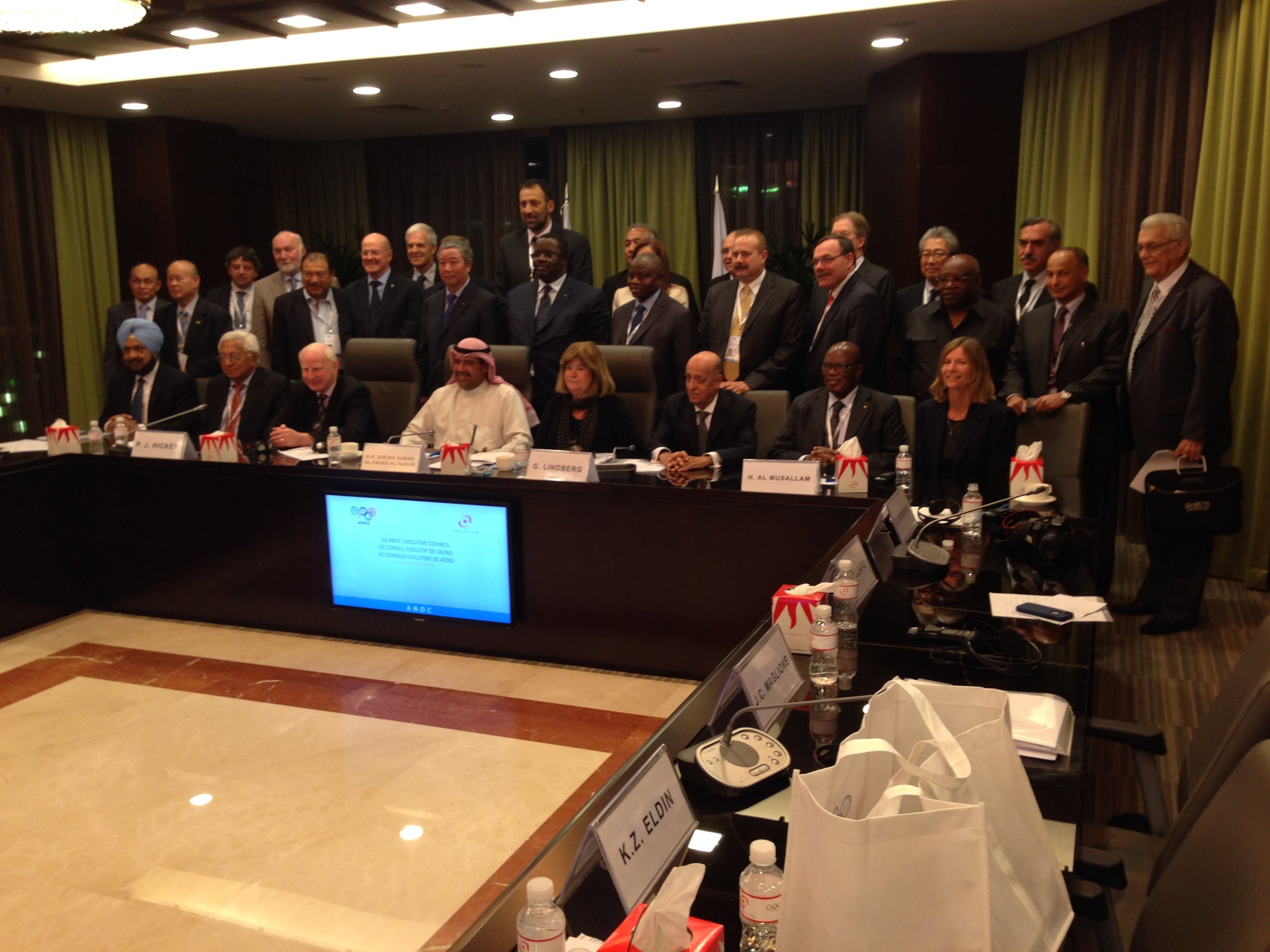KUWAIT CITY, Kuwait — When you are living it in the moment, it is of course a challenge indeed to know whether a three-day meeting spread across a hotel complex and an office tower makes for a turning point, the sort of thing that accounts for the sort of thing Olympic historians can one day point to with distinct accuracy and say, this was when it all came together. As it drew Monday night to a close, however, it seemed abundantly evident that the time is now for the 204-member Association of National Olympic Committees.
Headed by the charismatic Kuwaiti Sheikh Ahmad Al-Fahad Al-Sabah, ANOC seems poised to assert itself on the Olympic scene as never before.
Against the backdrop of the International Olympic Committee’s own 2014 review process, dubbed “Olympic Agenda 2020,” with the international sports federations due next week to meet in Turkey at the SportAccord conference under the leadership of the influential Marius Vizer, ANOC — first on the post-Sochi calendar — made the most of the timing.
IOC president Thomas Bach, and Vizer, among others, were in attendance here in Kuwait.
In all, 41 of the 106 IOC members were drawn to this desert meeting.
Actually, three separate sessions took place:
— ANOC, overseen by Sheikh Ahmad since a revolution of sorts in Moscow in 2012. The organization had been headed — since its June 1979 founding — by Mexico’s Mario Vazquez Raña.
— Olympic Council of Asia, the regional confederation, overseen by Sheikh Ahmad since 1991.
— Olympic Solidarity, the IOC initiative, overseen now as well by Sheikh Ahmad, that aims to identify and train promising athletes from around the world. It carries a 2013-2016 budget of $438 million.
The trip to Kuwait marked Bach’s first to the region since becoming IOC president last September. In a news conference Saturday, noting the participation of ANOC, OCA and others in Olympic Agenda 2020, he called these meetings an “important step in the procedure.”
ANOC, meanwhile, kicked things off Saturday with a series of commission meetings.
So what?
So often the volunteers who make up the Olympic movement are derided for what is depicted as the desire to belly up to some trough and pig out on all the free food and booze imaginable.
One, this is Kuwait. There wasn’t booze.
Two, these meetings were held in the second floor of the Missoni hotel, or alternatively at the Olympic Council of Asia complex, starting at 9 a.m. sharp. It was like being in a hotel room in Buffalo, or Cleveland, or anywhere. The doors were locked and no one got out, except for a coffee break, for three hours. The afternoon sessions? Same deal. Three hours, if not longer.
Three, the nine commissions were a first — specialized task-forces created, 30-some years after ANOC itself got launched, to, as a press statement would put it, “add fresh impetus to ANOC’s ongoing process of reform and modernization at a time when the IOC is calling on all stakeholders within the Olympic movement to undergo a process of self-analysis and self-evaluation.”
Here, for instance, was a “marketing and new sources of finance” commission, headed by Larry Probst, the U.S. Olympic Committee board chair and new IOC member.
“He’s a professional,” Sheikh Ahmad was saying Sunday night of Probst. “For that I was very happy when I was hearing all those reports. The road map is very clear. It’s never too late, as I was mentioning in the beginning.”
There was a “modernization follow-up commission.”
There were, among others, finance, juridical and medical panels.
Too, here was an athletes’ commission, headed by Barbara Kendall, winner of gold, silver and bronze medals in windsurfing, also an IOC member and, moreover, runner-up in 2009 in the New Zealand version of “Dancing with the Stars.”
And so on — all part of the professionalization of ANOC.
ANOC also approved a new logo, the design soon to be made public.
It authorized plans, at a one-time cost of $20 million, for new headquarters in Lausanne, Switzerland. Sheikh Ahmad said at a news conference Monday night he was confident the bid would be brought in under budget.
Plans are in the works for a world Beach Games, perhaps as soon as 2015; interest has been solicited from a number of cities; a final report on the project is due at a meeting, set for Lausanne of the ANOC executive council in July, the sheikh said.
Another project — a gala awards ceremony. This is now set for Nov. 7, at the ANOC general assembly, in Bangkok. The concept — they’re thinking big — is for this gala is in very short order to become the sports Oscars, and with all due respect to every other show out there, ANOC has ambition and resource.
“I think this the reality of the NOCs,” Sheikh Ahmad said Monday night at that same news conference. “I think the NOCs have a good role to play in the movement …
“The head is the IOC. At the right hand should the NOCs. The left hand should be the IFs," meaning the international sports federations. "This, I believe, is the summary of the situation.
“For that we have to work because we lost 30 years of our movement.
“We have to work in a very speedy way to reach exactly all our demands. This is the demand of our NOCs.
“What we promised in the Moscow general assembly [in 2012], I think we will achieve it all in Bangkok.
“In two years we will have achieved everything. Then we will have a stable situation to develop and achieve our success.”



